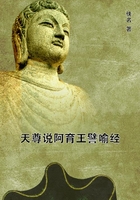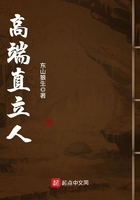There is another point concerning which it is very necessary to have clear ideas. Suppose a carpenter in Lanzerote to be engaged in making chests of drawers. Let us suppose that a, the timber, and b, the grain and meat needful for the man's sustenance until he can finish a chest of drawers, have to be paid for by that chest. Then the capital with which he starts is represented by a + b. He could not start at all unless he had it; day by day, he must destroy more or less of the substance and of the general adaptability of a in order to work it up into the special forms needed to constitute the chest of drawers; and, day by day, he must use up at least so much of b as will replace his loss of vital capital by the work of that day. Suppose it takes the carpenter and his workmen ten days to saw up the timber, to plane the boards, and to give them the shape and size proper for the various parts of the chest of drawers. And suppose that he then offers his heap of boards to the advancer of a + b as an equivalent for the wood + ten days' supply of vital capital? The latter will surely say: "No.
I did not ask for a heap of boards. I asked for a chest of drawers. Up to this time, so far as I am concerned, you have done nothing and are as much in my debt as ever." And if the carpenter maintained that he had "virtually" created two-thirds of a chest of drawers, inasmuch as it would take only five days more to put together the pieces of wood, and that the heap of boards ought to be accepted as the equivalent of two-thirds of his debt, I am afraid the creditor would regard him as little better than an impudent swindler. It obviously makes no sort of difference whether the Canariote or Teneriffian buyer advanced the wood and the food-stuffs, on which the carpenter had to maintain himself; or whether the carpenter had a stock of both, the consumption of which must be recouped by the exchange of a chest of drawers for a fresh supply. In the latter case, it is even less doubtful that, if the carpenter offered his boards to the man who wanted a chest of drawers, the latter would laugh in his face. And if he took the chest of drawers for himself, then so much of his vital capital would be sunk in it past recovery. Again, the payment of goods in a lump, for the chest of drawers, comes to the same thing as the payment of daily wages for the fifteen days that the carpenter was occupied in making it. If, at the end of each day, the carpenter chose to say to himself "I have 'virtually' created, by my day's labour, a fifteenth of what I shall get for the chest of drawers--therefore my wages are the produce of my day's labour"--there is no great harm in such metaphorical speech, so long as the poor man does not delude himself into the supposition that it represents the exact truth. "Virtually" is apt to cover more intellectual sins than "charity" does moral delicts. After what has been said, it surely must be plain enough that each day's work has involved the consumption of the carpenter's vital capital, and the fashioning of his timber, at the expense of more or less consumption of those forms of capital.
Whether the a + b to be exchanged for the chest has been advanced as a loan, or is paid daily or weekly as wages, or, at some later time, as the price of a finished commodity--the essential element of the transaction, and the only essential element, is, that it must, at least, effect the replacement of the vital capital consumed. Neither boards nor chest of drawers are eatable; and, so far from the carpenter having produced the essential part of his wages by each day's labour, he has merely wasted that labour, unless somebody who happens to want a chest of drawers offers to exchange vital capital, or something that can procure it, equivalent to the amount consumed during the process of manufacture.
See the discussion of this subject further on.
That it should be necessary, at this time of day, to set forth such elementary truths as these may well seem strange; but no one who consults that interesting museum of political delusions, "Progress and Poverty," some of the treasures of which I have already brought to light, will doubt the fact, if he bestows proper attention upon the first book of that widely-read work. At page 15 it is thus written:
"The proposition I shall endeavour to prove is: that wages, instead of being drawn from capital, are, in reality, drawn from the product of the labour for which they are paid."
Again at page 18:-,"In every case in which labour is exchanged for commodities, production really precedes enjoyment . . . wages are the earnings--that is to say, the makings--of labour--not the advances of capital."
And the proposition which the author endeavours to disprove is the hitherto generally accepted doctrine ..."that labour is maintained and paid out of existing capital, before the product which constitutes the ultimate object is secured"
The doctrine respecting the relation of capital and wages, which is thus opposed in "Progress and Poverty," is that illustrated in the foregoing pages; the truth of which, I conceive, must be plain to any one who has apprehended the very simple arguments by which I have endeavoured to demonstrate it. One conclusion or the other must be hopelessly wrong; and, even at the cost of going once more over some of the ground traversed in this essay and that on "Natural and Political Rights,"I propose to show that the error lies with "Progress and Poverty"; in which work, so far as political science is concerned, the poverty is, to my eye, much more apparent than the progress.
Collected Essays, vol. i. pp. 359-382.
To begin at the beginning. The author propounds a definition of wealth: "Nothing which nature supplies to man without his labour is wealth" Wealth consists of "natural substances or products which have been adapted by human labour to human use or gratification, their value depending upon the amount of labour which, upon the average, would be required to produce things of like kind".















